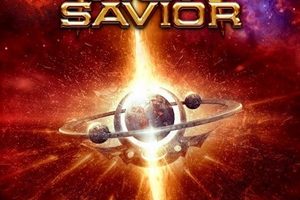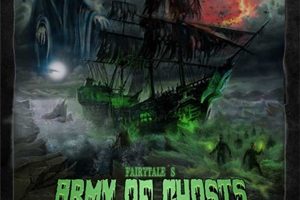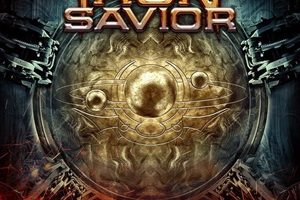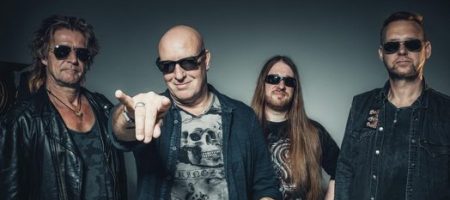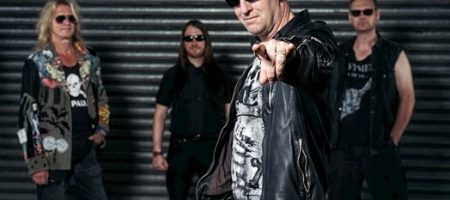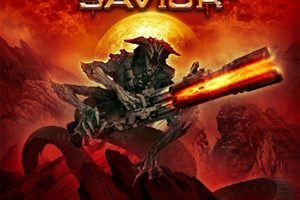Iron Savior – Hovering In Another World
Sunday, 29th May 2016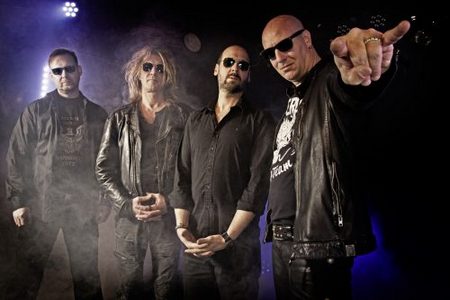
Garnering instant media attention right out of the gate due to Kai Hansen’s involvement, Iron Savior took on science fiction and power metal in the late 1990’s with passion and glory. Vocalist/guitarist Piet Sielck would watch the band rise up the ranks, see key members move on (Kai leaving after their third album The Dark Assault) and others return (bassist Jan S. Eckert in 2011 after a nine-year absence). Throughout the twists and turns, Iron Savior have always strived to keep the focus squarely on the music – bringing us to their ninth studio record Titancraft.
If you love mid-tempo anthems and faster, double bass oriented arrangements as well as sing-a-long choruses with a lot of German power, Iron Savior maintains their consistency record to record. Fortunately on this press go around our Skype connection with Piet would work. So enjoy this half-hour discussion about the band’s discography, learning from the dissolution of running your own record label, and his thoughts on current events from AC/DC to refugees entering his homeland in a professional manner. And let’s hope that the band can make it back to North American shores, even if it’s another one-off festival show – because there’s something magnificent about Iron Savior on the live front.
Dead Rhetoric: Titancraft is the ninth Iron Savior full length studio record. What keeps the creativity flowing for the band this deep into your career – and is it tough to not repeat yourself?
Piet Sielck: Yes, of course it’s tough not to run into that trap. The only way to avoid this is to be super critical to yourself, you know? Don’t get satisfied with something which is okay. It has to be top notch all the time- and at least that’s what I’m trying to do. Sometimes it works, sometimes it doesn’t work- and that material ends up going in the trash.
Dead Rhetoric: How does the process work for you in terms of songwriting and producing versus your guitar playing and singing- are there times that you need to block out to get specific work done, and learn your own body clock rhythms to achieve the best output?
Sielck: Usually I start with composing the song on the guitar and work on all that stuff first. While I do that some vocal ideas start to pop up in my mind. Once the song is done, I burn it on CD or put it on my iPhone to keep listening to it in the car. Just to work out some vocal lines or work out the ideas. There are also songs where everything happens at the same time. It depends on the song. I am not a night worker anymore, I’m too old for this and I have a family, so I usually work during the day. Singing for me works best in the morning around 10 am or so- I have the best results, my voice is fresh and I can do all the high stuff. Usually in the afternoon I can do some singing too.
Dead Rhetoric: Which comes easier to the band- the faster power metal tracks like the title track and “Strike Down the Tyranny” or the more controlled, anthem oriented songs such as “Brother in Arms” and last album’s “Iron Warrior”?
Sielck: It’s really hard to say because we are known for both. If you look at the early days, say the first three or four albums, the speed stuff is a higher percentage of the songs in general. That changed a little bit while we are getting older (laughs). I think both suit Iron Savior pretty well. We love these mid-tempo songs we have but there is nothing wrong with a decent speed track.
Dead Rhetoric: The song “Gunsmoke” on the new record seemed a bit of a surprise, where did the inspiration come for that?
Sielck: First of all, it was a song and I had no idea what to do with it. I was digging into all the things I kind of like, and I remember I had this song on The Landing about this Clint Eastwood kind of guy, why not make something out of The Magnificent Seven, old stuff from the 50’s that I grew up watching on television when I was a kid. And that was the inspiration then for the “Gunsmoke” lyrics, and those little atmospheric things at the beginning and the end were spontaneous ideas in the studio. I didn’t have a good ending for the song, and as it is on the album it ends rather abruptly. I was faced either to compose an ending, the usual stuff, so suddenly this spaghetti western thing popped up in my mind so I said, ‘hey why not’. I love it, I must say (laughs)… especially the ‘Man’.
Dead Rhetoric: How did you come about recording the Swedish alternative/dance rock band Mando Diao’s track “Dance with Somebody” for the last album Rise of the Hero – as it’s for certain an unexpected choice to give an Iron Savior interpretation?
Sielck: That’s right. That more or less has been an experiment. We had been very happy back in the days with a cover of “Crazy” from Seal, which is a very non-metal song. That was from the Condition Red album, sometimes when you have an inspiration you should follow it. We had an inspiration with this song, we could all hear very well how this could be transformed into an Iron Savior thing. While we were working in the studio and recording it, it turned out to be better than we expected. It was to be a Japanese bonus track but we liked it so much we decided to put it out as a regular track on the album. And definitely it has been… some liked it, some didn’t- it was controversial but we had something to talk about.
Dead Rhetoric: Given time now to reflect on the totality of Iron Savior discography, which albums do you hold in highest regard – even if they may not necessarily be the best sellers or most popular with your fans?
Sielck: Oh, that’s really hard to say. In a way every album that we’ve done in the past means something special to me. The first one is our debut, it’s the one where everything started out, Unification and The Dark Assault are also special albums to me. Condition Red was the first album without Kai Hansen, Battering Ram is the last album I did with Noise, Megatroplis is the one I did with my former record label which went bankrupt. The Landing has been the comeback album, Rise of the Hero is the one that has had the highest chart history, and so here we are with Titancraft. It’s a mean question, I cannot answer this! (laughs). Basically every album has something that is very emotional about it, I can remember the different states of mind I was in while doing them. Put it like this – all the albums also reflect my personal development, my history. Because there is a lot of personal stuff in all of my albums.
Dead Rhetoric: Where did your interest in science fiction begin- and which medium do you appreciate more to satisfy your fix in the genre: books, movies, or television shows?
Sielck: It definitely started out when Star Trek was broadcasted in my childhood, I loved it. I watched every episode – continuing on with The Next Generation. As far as the medium I prefer, it’s really hard to say. I love the television thing, I also love movies. I read a lot of books… it’s a good balance of all. I cannot really say I have one I prefer over the other. It’s a really different thing, what I like about television shows is that it’s an ongoing story, even though it may be closed episodes but it’s a continuing story that draws a red line through the episodes. A movie is a big thing, if it blows you away, it’s awesome. The new Star Trek – the first one of the new series blew me away a couple of years ago. A book can trigger so much of your own fantasy, pictures that you don’t have if you go to a movie.
Dead Rhetoric: What do you consider the biggest learning experiences you had regarding the running of a record label with Dockyard 1 and its untimely demise?
Sielck: Never to do it again! (laughs) No, just kidding. My biggest mistake was that I was trusting too much the people I did it together with. And that unfortunately was not a good thing. I really want to trust people, it was a mean lesson in life that my trust was so dishonored. Actually coming back to the first thing- I’m cured from that, I don’t think I’m the same person who could run a record label.
Dead Rhetoric: You have a strong opinion you’ve expressed on social media regarding Axl Rose fronting AC/DC for their remaining tour dates – do you think this was handled in the right way for such a legacy band in the industry?
Sielck: My personal opinion about it, it’s quite positive on Facebook – I think this was the worst decision Angus (Young) ever took. What he did with this, it’s so obvious that it’s all about money. That is total 360 degree turn into everything that the band has been standing (about) for decades. We are about music, not about money – I don’t know. You can think of Axl what you want, I don’t like him personally. He may be a fair singer for what he’s doing in Guns ‘n Roses, but he’s not the right guy for AC/DC. I’m very unhappy with this. There would have been a lot better choices. Money is something that AC/DC denied for such a long time. I thought they were cool guys- an illusion is crashed (laughs).
Pages: 1 2











